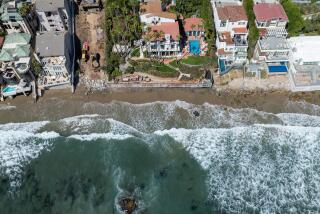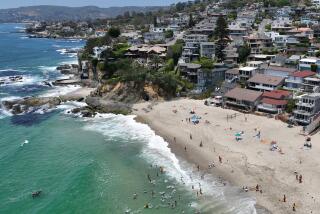Surf, Sand Still Lure Longtime Lifeguard
- Share via
Claude Panis drove a red rescue Jeep over freshly raked sand in Huntington Beach, smiling despite the stiff, chilling breeze that whipped in from the ocean.
“It’ll clear up by noon,” Panis said. “I know.”
There is no place Panis, a career lifeguard, would rather be. He has not left this beach for more than a few days in years.
For Panis this summer, with its crowds and its crises, will be the 12th as a lifeguard in Huntington Beach. He will see hundreds of thousands of residents and visitors flock to the sand, and he will see at least a few thousand of them suddenly in trouble in the surf.
Panis is a marine safety officer, a supervisor patrolling the three-mile stretch of city-operated beach year-round, ready to back up lifeguards who keep watch in the summer from the beach’s 27 blue-and-red towers.
But please, just call him a lifeguard.
“I couldn’t sit in an office from 9 to 5,” Panis said. “I have this aversion to paper.”
Panis is a lifer, a veteran at just 27. The beach, and lifeguarding, have been his career.
“Ever since I’ve been a kid, I’ve had this attraction to the beach,” Panis said. “I get
nervous when I go inland. The ocean is like a second home to me.”
Born in Hawaii, Panis swam competitively as a child and joined the Huntington Beach Junior Lifeguard program at age 10. He later spent time in lifeguard towers, getting a peek at a job that would become his lifelong profession.
“I stuck it out,” he said. “I knew I had to wait for my calling. My dad kept asking, ‘When are you going to get a real job?’ He said I can’t keep messing around on the beach all day.”
To become a lifeguard, candidates must compete in three swims, held in late winter in chilly water. Once hired, they may return each summer as long as they pass an annual test swim of 1,000 yards in less than 15 minutes.
“They’re definitely a unique breed,” Panis said. “I always looked up to lifeguards. They were my heroes. They were strong and physically sharp. I was impressed with the image they portrayed.”
In his second year of lifeguarding, Panis rescued three girls with a single buoy after they got caught in a rip current amid lashing waves, sending them on a crash course toward the pier. Panis said they grabbed at each other’s hair.
“I had my doubts that I would get them in,” he said. “I kept thinking, ‘I don’t want to see anyone die here.’ I knew how to handle myself, but you still have a lot of respect for the power of the waves.”
If this summer is like the last in Huntington Beach, more than 6 million people will flock to the beach. Nearly 3,000 will need to be rescued from the surf. Lifeguards, Panis said, are trained to anticipate those moments.
“We don’t wait for a big, dramatic situation,” he said. “We don’t wait until a guy is thrashing his arms and going down. We don’t have lifeguards saying, ‘Oh, a drowning. Time for me to work.’ ”
Usually, lifeguards watch for danger signs and yell warnings before drownings begin, he said.
People most likely to need rescuing, Panis said, are drunk or wear shirts that weigh them down or play on inner tubes, which can send swimmers on a one-way ride to open water.
“And you get guys who want to impress their girlfriends,” he said. “We rescue more guys than we do girls. They always want to show their girlfriends how macho they are. The girls have enough sense to stay out.”
Working in life-or-death situations has led to high rates of burnout. “We’ve had people working here who couldn’t handle it,” Panis said. “They checked out.”
In the water, Panis has been fortunate. He has never failed at a rescue, but there have been many close calls.
“I’ve accepted that I’ve put myself in a job where I’m going to have to deal with those things,” said Panis, a licensed emergency medical technician. “As long as I’m doing the best I can, I can walk away knowing that I’ve done everything I could.”
Lifeguard Mike Gifford, 29, has known Panis since they were boyhood friends in the Junior Lifeguard program.
“He loves this job,” said Gifford, who, unlike Panis, plans eventually to leave lifeguarding. “He doesn’t try to make it an intellectual thing. Instead, he puts his heart and soul into it.”
Panis, who lives with his wife and two children in Orange, plans to avoid being a full-time administrator as long as he can.
“I just want to teach (others) how to be good lifeguards,” he said. “I always tell them that without us, the beach would be a deathtrap.”


